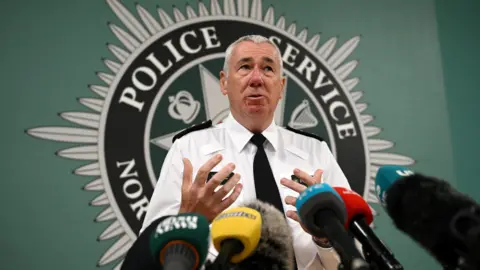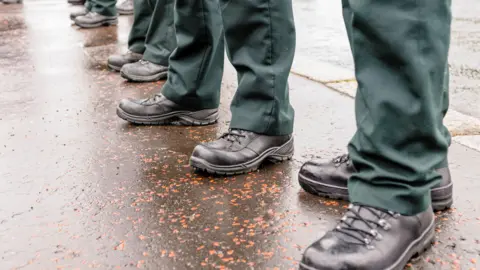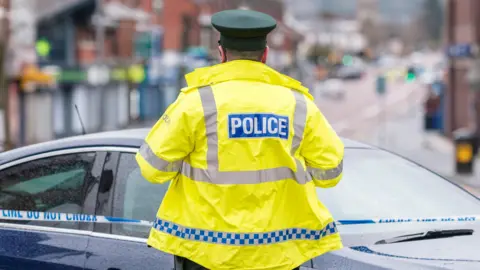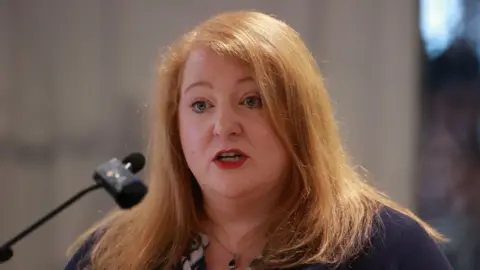PSNI online child sex abuse unit 'struggling to meet demand'
 Getty Images
Getty ImagesThe Police Service of Northern Ireland must improve how it manages risks posed by violent and sexual offenders, an inspection report has found.
It warned that financial pressures were "limiting" what the organisation can do in several areas, including neighbourhood patrolling.
It also stated the unit, which deals with online images of child abuse, has insufficient staff and "can't effectively manage its high workloads".
Deputy Chief Constable Bobby Singleton said he hoped the report would be "a wake-up call to properly fund" the Police Service of Northern Ireland (PSNI).
The report was made by His Majesty's Inspectorate of Constabulary and Fire & Rescue Services (HMICFRS).
Lee Freeman, from HMICFRS, said he had "concerns about the performance of the service in keeping people safe, preventing crime and providing victims with an effective service".
He described the current resource picture as "stark".
The PSNI currently has an all-time low of 6,300 officers and is seeking approximately £200m in additional funding from Stormont to boost its numbers.
Neighbourhood policing is about 400 officers short and "has borne the consequences" of budget pressure, the report stated.
"The continued financial pressures facing the service, if unresolved, are likely to further affect the service it can provide," Mr Freeman added.
"The chief constable, his officers and staff are clearly determined to provide a high quality service and to secure the trust and confidence of all communities.
"The financial pressures mean, however, that the service is currently limited in what it is able to achieve."
'Real world consequences'
Speaking to the BBC's Evening Extra programme, the Commissioner Designate for Victims of Crime Geraldine Hanna said the report is a "real validation of people's experiences".
"If neighbourhood policing is ineffective, that might mean that a victim of a hate crime doesn't come forward to report it.
"If the management of sex offenders in our communities is ineffective, in the worst case scenario, that can lead to an individual going on and re-offending.
"These are real world consequences to what the report is highlighting," she said.
 Getty Images
Getty ImagesThe report flagged a number of issues around dealing with offenders.
Offender managers are responsible for managing violent and sexual offenders.
Each manager was found to have 100 offenders to manage – twice the recommended number.
"If workloads are high, the service may miss opportunities to manage offenders," the report stated.
"It may also increase the risk of further reoffending and the risk to communities.
"The service needs to develop a plan to reduce the ratio of offenders to offender managers."
The inspection also found the child internet protection team (CITP), which deals with online images of child abuse, is under resourced and "struggling to meet demand".
It cannot handle the number of referrals it receives from the National Crime Agency and investigations are being delayed by a backlog in examining electronic devices.
 Getty Images
Getty ImagesCIPT staff, who are trained to view indecent images of children, are not being provided with adequate welfare provision.
The report added: "The service should do more to make sure suspects managed by the child internet protection team are complying with their bail conditions
"We found that the service usually had a sound rationale for its decisions about whether to grant bail to people suspected of accessing indecent images of children, and what conditions to place on them.
"But we found the team was unable to monitor pre-charge bail and deal with any breaches due to its high workload."
'Underinvestment cannot continue'
Deputy Chief Constable Bobby Singleton said the findings were "undoubtedly disappointing".
"The inspectorate findings are sadly evidence of what we have been repeatedly warning for some time – namely that less police inevitably leads to less policing and a greater risk of threat and harm to the public," he said.
"This report sets out the very real impact that chronic underfunding is having on our ability to protect the public.
"This underinvestment cannot continue."
Policing Board chair Mukesh Sharma said the report reinforced the importance of investing in policing.
He welcomed the fact it recognised the "dedication and commitment" of the PSNI's workforce.
 PA Media
PA MediaJustice Minister Naomi Long said the report highlighted the "critical need" to address the decline in police officer numbers.
"The chief constable and I are fully committed to recovering workforce levels to 7,000 officers and 2,572 staff within the next three years," she said.
"By keeping communities safe we enable them to have the confidence they need to live productively and engage fully in society.
"That is clearly laid out in the new programme for government, and I will continue to advocate strongly for additional resources for the PSNI to enhance public safety."
'Burnout is a reality'
Liam Kelly, the chairman of the Police Federation for Northern Ireland (PFNI), the body that represents police officers, said the report's findings were neither "surprising or new".
Policing inevitably suffers, he said, when officers are "depleted, over-stretched and doing more with less".
"We are dangerously low in numbers and it is unfair to expect our present officer cadre to continue to pick up the slack indefinitely," Mr Kelly said.
He added: "Burnout is a reality and it will only get worse if there isn't prompt funding intervention soon."
